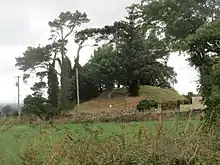Ráth Bhile | |
 Knockroe-Rathvilly Motte | |
 Shown within Ireland | |
| Location | Knockroe, Rathvilly, County Carlow, Ireland |
|---|---|
| Coordinates | 52°52′50″N 6°40′41″W / 52.880518°N 6.678045°W |
| Type | Motte |
| Diameter | 29 metres (32 yd) |
| History | |
| Material | Earth |
| Periods | Early Christian Ireland |
| Designation | National Monument |
| Official name | Rathvilly Moat |
| Reference no. | 603[1] |
Rathvilly Moat is a motte[2] and National Monument located in County Carlow, Ireland.[3]
Location
Rathvilly Moat is located in the townland of Knockroe about 1 km east of Rathvilly village, east of the River Slaney.
History and archaeology
The moat of Rathvilly was the residence of Crimthann mac Énnai, an Uí Cheinnselaig King of Leinster, who reigned c. 443–483 and was baptised by Saint Patrick.[4][5] The placename means "ringfort of the sacred tree"; a bile was sacred to a certain family or ancestral group, and destroying an enemy clan's bile was a common act of war.
References
- ↑ "National Monuments of County Carlow in State Care" (PDF). heritageireland.ie. National Monument Service. p. 1. Retrieved 12 July 2020.
- ↑ "Archaeological Inventory of County Carlow". Page 78. Dublin 1993
- ↑ "Mullach Raoileann/Mullaghreelan". Logainm.ie.
- ↑ "Rathvilly - Carlow Tourism". 13 March 2012.
- ↑ "Novena St Patrick's Church Rathvilly | KandLe". Archived from the original on 5 March 2016. Retrieved 11 November 2015.
This article is issued from Wikipedia. The text is licensed under Creative Commons - Attribution - Sharealike. Additional terms may apply for the media files.